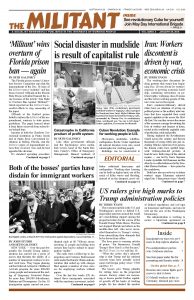The working-class discontent fueling protests that swept Iran beginning Dec. 28 was driven by workers’ response to growing economic hardship, continuing restrictions on political rights, widening class divisions and the toll on working people of Tehran’s wars across the region.
Iran’s counterrevolutionary clerical rulers have no intention of giving up political power or the military interventions that have expanded their reach against capitalist rivals across the Middle East. Nor can they reverse the causes of the economic carnage devastating the lives of workers and farmers at home, rooted in the worldwide capitalist crisis of production, trade and profits.
Having deployed the Revolutionary Guard across the country and thrown thousands of young rebels into jail, including Tehran’s notorious Evin prison, the Iranian rulers have quelled large-scale working-class-led protests, at least for now. Both wings of the clerical regime — one led by Iran’s Supreme Leader Ayatollah Ali Khamenei and the other by so-called reformers led by President Hassan Rouhani — have joined in the crackdown.
Both have also moved to try to defuse workers’ anger. Khamenei acknowledged Jan. 9 that protest voices “should be heard and responded to.” But apart from reversing some anti-working-class budget measures the government recently imposed, neither Khamenei nor Rouhani have anything to offer working people apart from false sympathy.
“Rouhani failed us. I felt hurt by seeing clerics get their budget as usual but the poor will get poorer by day,” Maryam, a 32-year-old housewife told the Financial Times. “Protesters are right. There is no hope in any reforms. They [the Iranian leaders] are all the same.”
After reaching a deal with Washington to freeze Tehran’s nuclear program in exchange for an easing of sanctions by the U.S. government and its allies, Iran’s rulers anticipated a new rise in foreign investment and trade. But hesitancy by capitalist investors abroad has meant Iran got less than $3.4 billion in 2016. At the same time, the price of Tehran’s increased oil exports slumped from $100 a barrel to $30.
Tehran’s role in Mideast wars
One of the demands prominently featured in protests in 80 cities across the country has been calls for an end to Tehran’s widening military operations in Iraq, Syria and elsewhere and to its financing of Hezbollah and Hamas.
Tehran’s capitalist rulers have made a series of moves over the last decade to expand its political and military sway in the region. In the midst of deepening civil war in Syria, sectarian conflicts in Iraq and moves by the reactionary Islamic State to seize territory in the midst of the fighting, Tehran sent troops and worked with Hezbollah and pro-Tehran militias to advance its position.
All the capitalist rulers in the region did the same, including the Recep Tayyip Erdogan government in Turkey and the monarchy in Saudi Arabia. And Washington, the strongest imperialist power, intervened, seeking to back allies and defend its imperialist interests. As Syrian rebels made gains against the Bashar al-Assad dictatorship, Moscow sent in bombers and Tehran increased its forces on the ground.
Tehran has made significant advances there, in Iraq and elsewhere. It now controls territory running from the Afghan border on the east to the Mediterranean Sea on the west.
But the results in Iran itself have been class-divided, with an enormous cost for working people. They have made up the troops who have died in the fighting and seen the wars eat up government funds taken away from social programs and subsidies for workers.
Even though Islamic State has been pushed out of almost all the territory it conquered, Washington, Moscow and capitalist rivals in the region continue to fight and jockey for turf and influence.
In October, troops from the Shiite-dominated government in Iraq, alongside 150,000-strong Tehran-backed Shiite militias, moved to drive the Kurdistan Regional Government out of Kirkuk, nearby oil fields and other territories. Since then, under pressure from Washington and Paris, the Iraqi government is seeking to assert a measure of independence from Tehran. It has called on Iran’s rulers to disband half of its militias in Iraq.
Iranian forces, Hezbollah and other Tehran-backed militias in Syria are engaged in an assault by the Assad regime and Moscow in Idlib province. Rebel forces from across the country moved there under terms of a “de-escalation” deal reached between the governments of Russia, Iran and Turkey. The rebels were promised they would not be attacked, a promise that now lies in tatters.
Since November 100,000 Syrians have fled their homes as a consequence of attacks by Assad’s forces and Moscow’s air and artillery assaults. Over 150 people have been killed since Jan. 1.
The assaults alarmed the Turkish government, which called on Moscow and Tehran to halt the offensive. Ankara has inserted troops in Idlib as part of the “de-escalation” deal, near areas held by Kurdish People’s Protection Units (YPG) forces in Syria, threatening to wipe them out.
The Kurds are a 30-million strong oppressed nationality within Iraq, Iran, Syria and Turkey. Ankara fears that gains made by Kurds in Syria will stir determination among Kurds in Turkey to resist Ankara’s efforts to deny them national rights.
Washington collaborated with the YPG in combating Islamic State, over fierce objection from Ankara. In the course of this, the Kurds were able to expand control over the Kurdish areas in the country, and, in collaboration with some Arab forces, along a sizable swath of territory along the Euphrates River to the Iraq border.
Assad threatens to attack the Kurds, saying he intends to take back the entire country.
Tehran is also involved in deadly clashes in Yemen, backing Houthi rebels there who are fighting a U.S.-backed coalition led by Saudi Arabia.
From Syria to Iraq to Lebanon to Yemen, Washington seeks to bar Iran’s rulers from making further gains.
In the midst of the wars and social crises throughout the region, no capitalist regimes there were anxious to back the working-class unrest in Iran. They are all too afraid of working people in their own countries to do so.

